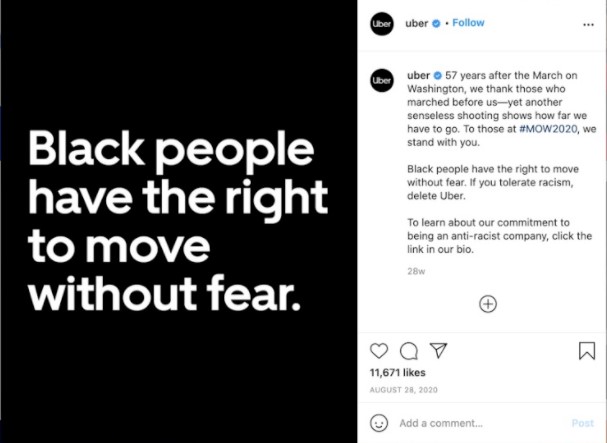Corporate activism is performative and does more harm than good
Screenshot of Uber’s Instagram account
Many corporations only speak on important issues to maintain their brand and appearance.
March 21, 2021
In the summer of 2020, the unjust killings of George Floyd, Breonna Taylor and countless other Black and brown Americans sparked protests around the world to demand social justice reform. Media coverage shifted its focus to the Black Lives Matter movement and the issue became a large focal point in the 2020 presidential election.
Additionally, the mass amount of attention on the Black Lives Matter movement gave an opportunity for major corporations to address where they stand in light of the events. Corporations like Uber and Microsoft openly supported the cause through statements on social media and monetary donations towards equal justice initiatives.
Showing solidarity for oppressed voices validates their struggle and encourages people to indulge in products guiltlessly.
Initially, it was exciting to see popular brands support the protests because it felt like a push for actual change was happening. Light was finally being shed on racial inequality, which is heavily ingrained in the American system.
However, the summer season has passed and calls for social change died faster than a social media trend. The lack of lasting corporate activism brings an important question to those who care about the movement.
Do corporations actually care about equality and inclusivity or is their performative activism only a ploy to make profits? To genuine activists, it seems to be the latter.
Standing in solidarity with a group during a divisive time only to never mention it again after it is no longer a news headline often does more harm than good.
In this era, a lot of our activism thrives off of social media awareness. If it is not consistently brought to focus, it fades away into dangerous obscurity. Corporations who only speak on issues when they are relevant significantly quickens the rate at which activism stops being a focus.
Over time the monetary donations become meaningless, as equality initiatives must eventually survive off of unreliable income. Furthermore, corporate preformative activism proves to the oppressive side that they are only commenting for appearances, and that corporations do not value anything other than profitable relevancy.
It is also deceitful, as (specifically large) corporations are aware that most people need to buy necessities from their stores. At this point, it seems favorable to have corporations not say anything at all. At least their absence of words say more than speaking to save face.
The public does not need more corporations pretending to care about the good of the people. Too many situations like this have stripped the genuinity of other corporations who actually advocate for a cause.
If the opposite were true, activism would not be perceived the way it is now.
As of this moment, a lot of activism seems superficial, especially when many cannot provide financial resources or frequently protest. This is unfair to them because they are genuinely passionate about social issues. We should not have to rely on large brands to briefly mention an issue for it be deemed important.
Major corporations need to implement change within their own activism to prove their genuineness to the public. A couple of sentimental words and one donation to the cause does not cut it anymore.
We are tired of the insincerity that oozes from a corporation’s solidarity message. If they do not want to change, then we do not want their “activism” anyway.
Natalie Navarro is an Assistant Opinion Editor for The Cougar Chronicle. She is a sophomore at CSUSM as a literature and writing major, as well as a theatre minor. After graduating, Natalie plans to further her education and become a teacher. She loves to read and play with her dogs.


